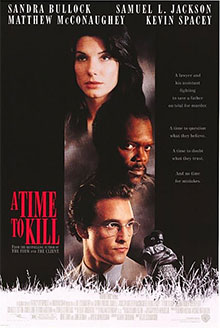A Time To Kill, Director: Joel Schumacher
Matthew McConaughey (Jake Brigance);
Samuel L. Jackson (Carl Lee Hooker);
Sandra Bullock (Ellen Roark);
Kevin Spacey (Rufus Buckley);
Patrick McGoohan (Judge Noose);
Kiefer Sutherland (Freddie Cobb); and
Donald Sutherland (Lucien Wilbanks).
A Time To Kill leaves the viewer wondering if more time had been spent on the plot, we wouldn't be left wondering just why we wasted so much time on a movie that promises more than it delivers. Although this film raises lots of questions about our American justice system, and forces us to face not only the question of guilt and innocence, but also the burning issue of justice within a society that is polarized along racial divides, there is entirely too much time spent in A Time To Kill on vilifying the Klu Klux Klan and taking detours simply detract from the case at hand.
It's an easy out to create bad guys out of overgrown Bubbas who cavort through moss draped woods burning crosses, and creating cartoons out of both black and white characters in the film. The real drama of this story lies in the complexity of the issues that challenge a struggling young Mississippi lawyer, played with flair by Matthew McConaughey. We are riveted by the superb performance of Samuel L. Jackson as the father of a 10 year old black girl who is brutally raped by two good old boys in a pickup truck. Jackson, who is certainly one of America's most powerful actors, does what a lot of fathers in the same circumstances might do. He kills the men before they even have the chance to go to trial.
So, we know that he "did the crime", but should he "do the time"? After all, if ever a murder could be justified, isn't this just about as close as we could come to justifying an execution of two despicable human beings? Despite a penchant for delving into subplots, A Time To Kill is best when we listen to the heart of the movie and remember that with every crime, there is a difficult puzzle of guilt and innocence to unravel.

